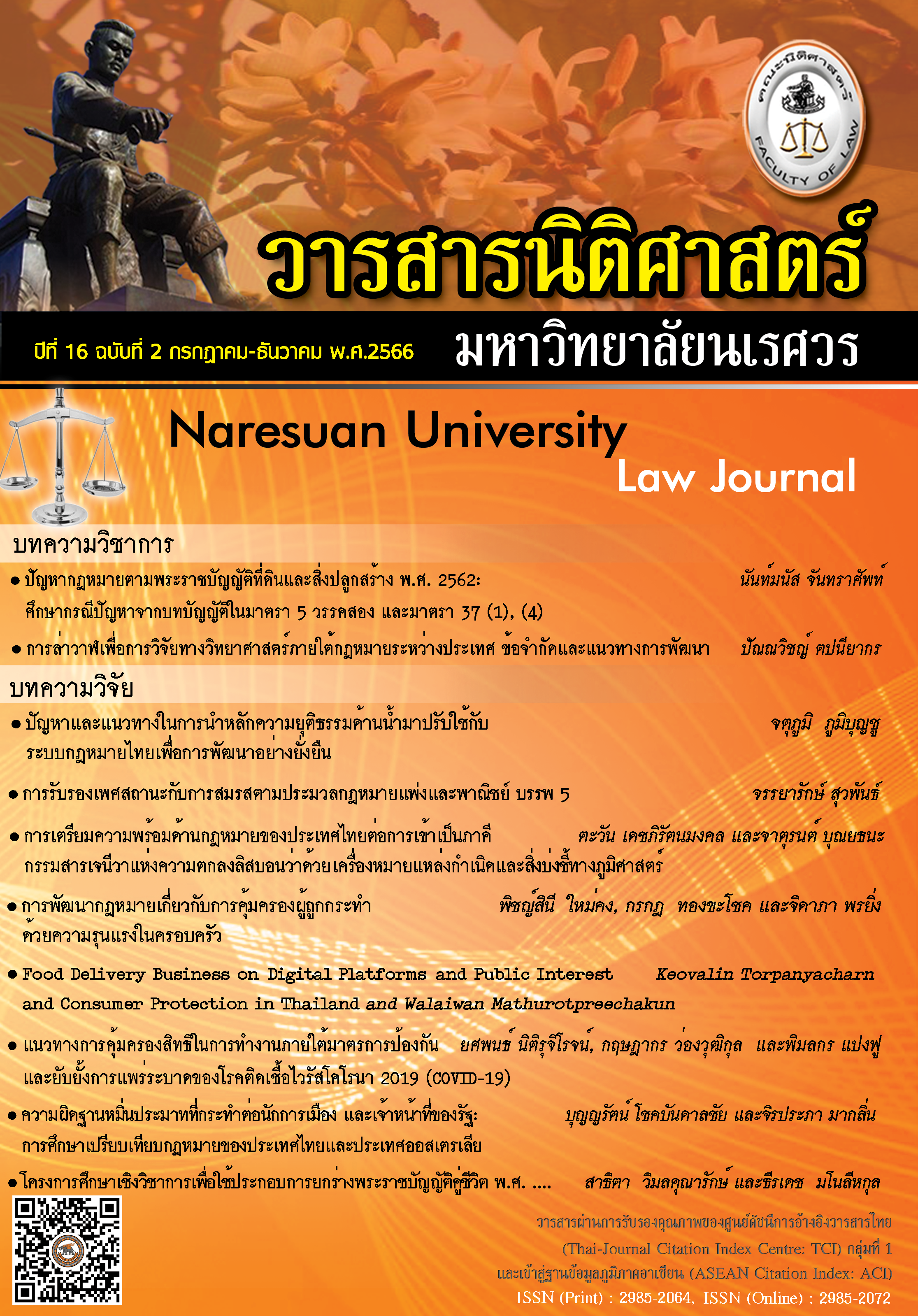ความผิดฐานหมิ่นประมาทที่กระทำต่อนักการเมือง และเจ้าหน้าที่ของรัฐ: การศึกษาเปรียบเทียบกฎหมายของประเทศไทย และประเทศออสเตรเลีย
Main Article Content
บทคัดย่อ
นักการเมืองและเจ้าหน้าที่ของรัฐมีอำนาจหน้าที่ในการปฏิบัติงานให้เป็นไป เพื่อประโยชน์ส่วนรวม ดังนั้น ในสังคมประชาธิปไตยจึงมีความสำคัญเป็นอย่างยิ่งที่จะต้องให้สิทธิกับประชาชนในการรับรู้ และตรวจสอบการปฏิบัติหน้าที่ของบุคคลดังกล่าว ในประเทศออสเตรเลียการหมิ่นประมาทที่กระทำกับนักการเมืองและเจเาหน้าที่ของรัฐจะไดัรับความคุ้มครองตามหลัก Implied freedom อันเป็นหลักการตามรัฐธรรมนูญซึ่งได้กำหนดคุ้มครองบุคคลผู้เผยแพร่ข้อมูลเกี่ยวกับกิจกรรมทางการเมืองและกิจกรรมของรัฐบาลไปสู่สาธารณชนโดยสุจริต เนื่องจากกิจกรรมดังกล่าวจะส่งผลต่อการตัดสินทางการเมืองของประชาชนในการเลือกตั้ง กรณีที่จะได้รับความคุ้มครองตามหลัก Political qualified privilege จะต้องปรากฏว่า (1) ผู้นำเสนอข้อมูลได้นำเสนอโดยมีเหตุอันควรเชื่อว่าข้อมูลนั้นเป็นความจริง (2) มีการตรวจสอบข้อมูลด้วยวิธีการที่เหมาะสม (3) ผู้นำเสนอเชื่อโดยสุจริตว่าข้อมูลนั้น ถูกต้อง (4) มีการนำเสนอข้อมูลย้อนกลับของฝ่ายที่ถูกหมิ่นประมาท ในประเทศไทย การหมิ่นประมาทนักการเมืองและเจ้าหน้าที่ของรัฐมีอยู่ในบทบัญญัติมาตรา 326 ของประมวลกฎหมายอาญา ศาลไทยมีแนวคำตัดสินว่าการวิพากษ์วิจารณ์เกี่ยวกับกิจการทางการเมืองและกิจการของรัฐบาลเป็นสิ่งที่เป็นประโยชน์ต่อส่วนรวม ผู้เผยแพร่ข้อมูลเกี่ยวกับกิจการทางการเมืองและกิจการของรัฐอันมีลักษณะหมิ่นประมาทอาจจะไม่ต้องรับผิดหากเป็นการกระทำโดยสุจริต ซึ่งหลักการดังกล่าวคล้ายกับประเทศออสเตรเลีย งานวิจัยมีข้อเสนอแนะว่าศาลไทยอาจนำหลักการตามกฎหมายรัฐธรรมนูญมาปรับใช้ในการคุ้มครองเสรีภาพในการแสดงความคิดเห็น
Article Details
เอกสารอ้างอิง
Armstrong, Mark, David Lindsay, and Ray Watterson. Media Law in Australia. Oxford: Oxford University Press, 1996.
Boonyarat Chokebandanchai. “Freedom of Expression: The Comparative Analysis between Thai and Australian Constitutional Rights.” Naresuan University Law Journal 13, no. 1 (2020): 91–114. [In Thai]
Boonyarat Chokebandanchai. Mass Communication Law: Protection of Personal Rights and Reputation, Dignity. Phitsanulok: Naresuan University, 2015. [In Thai]
Butler, Des, and Sharon Rodrick. Australian Medial Law. 5th ed. N.p.: Thomson Reuters, 2015.
Chesterman, Michael. The Media and the Law: Prohibited Publication, Topic 1 Free Speech and the Media, Reproduce Materials for Media Law: Prohibited Publication. New South Wales: The University of New South Wales, 1998.
Edgeworth, Brendan, and Michael Newcity. “Politicians and Defamation Law and the Public Figure Defiance.” Law in Context 10, no.1 (1992): 39-62.
Kanit Na Nakhon. Criminal Law, Offense Area. 11th ed. Bangkok: Winyuchon, 2016. [In Thai]
Pearson, Mark. The Journalist’s Guide to Media Law. NSW: Allen & Unwin, 1997.
Twekiat Menakanist. Criminal Code Reference Version. 28th ed. Bangkok: Winyuchon, 2012. [In Thai]
Worawit Ritthithes. Mass Media and Legal Liability. Bangkok: Winyuchon, 1995. [In Thai]
Yoot Saeng-Uthai, and Twekiat Menakanist. Criminal Law, Region 2-3. Bangkok: Thammasat University, 2010. [In Thai].


